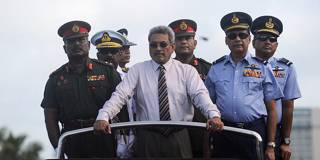At a time of growing international skepticism toward China's Belt and Road Initiative, the Rajapaksa family’s potential return to power is welcome news for Chinese President Xi Jinping. But it is bad news for practically everyone else.
COLOMBO – One of Asia’s oldest democracies may be in jeopardy. Sri Lanka’s presidential election next month, is expected to bring to power another member of the Rajapaksa family, whose affinity for authoritarianism, violence, and corruption is well known. While Sri Lanka’s democracy survived the last test – an attempted constitutional coup by outgoing President Maithripala Sirisena a year ago – it may not survive a Gotabaya Rajapaksa presidency.

COLOMBO – One of Asia’s oldest democracies may be in jeopardy. Sri Lanka’s presidential election next month, is expected to bring to power another member of the Rajapaksa family, whose affinity for authoritarianism, violence, and corruption is well known. While Sri Lanka’s democracy survived the last test – an attempted constitutional coup by outgoing President Maithripala Sirisena a year ago – it may not survive a Gotabaya Rajapaksa presidency.